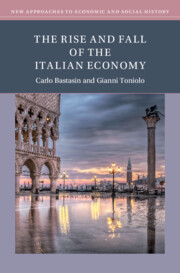Book contents
- The Rise and Fall of the Italian Economy
- New Approaches to Economic and Social History
- The Rise and Fall of the Italian Economy
- Copyright page
- Dedication
- Contents
- Figures
- Tables
- Preface
- 1 Italy’s Parabola, 1861–2022
- 2 Slow Economic Unification, 1861–1896
- 3 Convergence and Sorpasso
- 4 The Trauma of 1992
- 5 The Lost Opportunity, 1996–2007
- 6 Sliding toward Zero Growth
- 7 The Canary in the Coalmine
- Notes
- References
- Index
3 - Convergence and Sorpasso
Published online by Cambridge University Press: 24 August 2023
- The Rise and Fall of the Italian Economy
- New Approaches to Economic and Social History
- The Rise and Fall of the Italian Economy
- Copyright page
- Dedication
- Contents
- Figures
- Tables
- Preface
- 1 Italy’s Parabola, 1861–2022
- 2 Slow Economic Unification, 1861–1896
- 3 Convergence and Sorpasso
- 4 The Trauma of 1992
- 5 The Lost Opportunity, 1996–2007
- 6 Sliding toward Zero Growth
- 7 The Canary in the Coalmine
- Notes
- References
- Index
Summary
This chapter outlines the secular convergence of Italy’s GDP. From the mid-1890s to 1913, the centuries-long economic decline was reversed. Institution-building and time-consistent policies of monetary stability and reduction of the debt-GDP ratio were among the main causes. The convergence record of the fascist years is mixed. As growth-reducing factors, we highlight “prestige policies” leading to an overvalued currency, and autarky. Postwar reconstruction was swift, followed by a quarter-century catch-up growth and cultural renaissance. The 1970s were turbulent years, marked by terrorism and inflation. Growth however continued to show unexpected resilience. Seeds of future weaknesses were nonetheless sown. Social tensions were eased by deficit-financed benefits. In the 1980s growth continued but the ratio of debt to GDP rose from 50 to almost 100 percent.
- Type
- Chapter
- Information
- The Rise and Fall of the Italian Economy , pp. 37 - 84Publisher: Cambridge University PressPrint publication year: 2023

